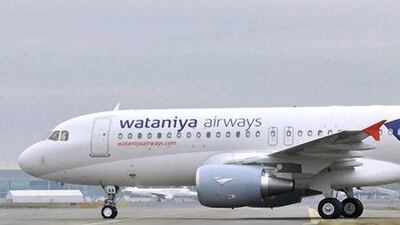Customers of Wataniya Airways, a Kuwaiti carrier that began flying in 2009, have been left stranded after the carrier shut down on Wednesday, citing its precarious financial situation and regional instability.
It also blamed "the lack of fair-trade requirements in the local market" for its difficulties, without elaborating.
"Starting March 16, Wataniya Airways has ceased all its operations and will now enter a process to determine the future of the company," it said on its website.
"Unfortunately, the company is not in a position to offer alternative flights."
The demise of the company, which is listed on the Kuwait Stock Exchange, comes as jet fuel costs are rising and Middle East travel is being hurt by civil unrest in many countries in the Mena region.
Wataniya began flying in January 2009 with service to Dubai from a VIP "Royal Terminal" at Kuwait International Airport.
Wataniya's business model included a single aircraft type, the Airbus A320, a strategy popular with budget airlines to cut maintenance costs, although the carrier offered a full suite of services including a "BusinessFirst" cabin.
Although there were already two Kuwaiti-based carriers - Kuwait Airways and Jazeera Airways, a budget carrier - serving the nation's 3 million people, Wataniya positioned itself by offering luxury services such as SMS text messaging and BlackBerry use.
"We have 26 seats in first class, and we want these passengers to feel as if they are boarding a 26-seat business jet," said George Cooper, the chief executive of Wataniya, at the airline's launch.
Scott Darling, an analyst with Nomura Securities in Dubai, said the airline's shutdown "should not come as too much of a surprise".
"The business model for a small carrier offering a premium cabin service with limited routes is likely to find the operating environment a challenge," he said.
The challenges for Wataniya included higher fuel prices, security concerns and pressure from more advantaged competition such as Emirates Airline, Etihad Airways and Qatar Airways.
"These operators offer scale, more route options and efficiency, not to mention brand strength," Mr Darling said.
At its peak, Wataniya operated nearly two dozen routes in the Middle East and to select European destinations. But in November the carrier said it would lay up several aircraft and cut routes to stem losses.
It did not disclose its financial results for last year, but the airline lost US$37.8 million (Dh138.7m) in 2009 and $5.4m in 2008.
Mr Darling said the news "did not bode well" for rival Jazeera Airways, which has also suffered losses, although he conceded that Jazeera's recent recapitalisation would provide some financial flexibility.
Saj Ahmad, an industry analyst and blogger at FBE Aerospace in London, said other failures could follow.
"We saw a swathe of failures in 2008 due to high oil prices, and now we may be on the cusp of a repeat - only this time the uncertainty in the Middle East and oil price rises are a double whammy for airlines," he said.
Suppliers that will be affected by the airline's closure include Kuwait's Alafco and AerVenture, which leased aircraft to Wataniya, and Dubai's Planet Group, the airline's general sales agent in the Emirates.
Wataniya was ranked sixth by weekly seat capacity to and from Kuwait, accounting for some 3.4 per cent of the total, according to data from Innovata. With Wataniya's departure, Istanbul and Vienna would no longer have a direct air link with Kuwait, the research company said.

